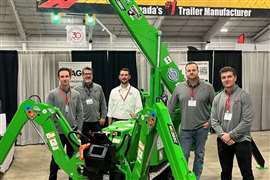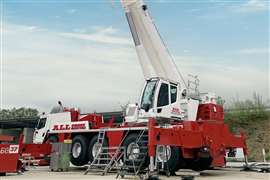The Appleton Column: The imitation game
18 March 2016

Well, it had to happen sooner or later. For a variety of reasons I’ve been thinking a lot about business strategy over the past few weeks and I think I had an insight. Finally – after twenty years.
The insight is this. I reckon that a substantial number of our business challenges are caused by our unwavering human desire to get, in sheep terms, into the centre of the flock.
We fear standing out. Even if we are the sheep that’s found a particularly tasty patch of grass well away from the flock we worry we might miss out on something that all the other sheep have got and so we slowly drift back towards them.
One of the comments you’ll hear more and more is ‘rental is a commodity business‘ and so, inevitably, our thoughts turn to how we can lower our costs, build our scale, sharpen our prices and pressure our suppliers so that we can be winners in this commodity market.
Even the use of the word ‘commodity ‘ conjures up pictures of piles of iron ore or coal; totally identical and ready for nothing but the furnace (of competition, in this case). Nothing, but nothing, except availability and price separates the different piles on offer. Is this really how it is?
Blue ocean strategy
Around ten years ago, a couple of professors from INSEAD, Renee Mauborgne and W. Chan Kim published a book called ‘blue ocean strategy‘ which talked about companies who had broken away from the bloody ‘red ocean‘ of commodity competition to find a market that was defined by them and where they could set the rules.
My problem with that approach (or at least how it was commonly presented) was that it seemed to require massive, and often technology based, reinvention of the company to create its own blue ocean.
That is a process which seems to me beyond most companies.
My most recent insight though, is that all companies have something that got them going in the first place. It might be the enthusiasm of an owner manager, or a particular way of selling, or a particular care for how customers are treated.
By definition, all companies that survive their first couple of years have some of the essential requirements for future success. The problem arises when the company gets bigger and they struggle to retain that original spark of genius as more and more people join the firm and have less and less identification with the founder’s original drive and vision.
In the face of this drift from the original spark of difference managers do the obvious thing. They see how everyone else has dealt with it. They either do nothing, and chaos emerges, or they imitate the same communications systems, the same operating models, the same IT systems, the same approach to pricing, the same equipment choices and, often, the same people as their competition.
Every one of those decisions takes them a step closer to the flock. Pretty soon the green grass of the start-up phase has been replaced by the parched earth and withered weeds of the commodity market.
The alternative
I think there’s an alternative. And I think the alternative is a return to the essence of the original spark – motivated human beings, each one imbued with the passion of the founder, committed to being outstanding in a very small number of areas and maybe just OK in many others.
This requires intense attention to selection, induction, mentoring and training – and these are hard things to prioritise when the business is growing like crazy.
However, companies that successfully manage the transition from start-up to larger business, or are already larger but choose to leave the flock and be different are the ones left grazing the sweet, nourishing grass. The others are ready for the furnace of competition.
This is a column from the March 2016 issue of IRN. To read the full article, with extra images and information, subscribe to the magazine: http://www.khl.com/subscriptions/magazines/international-rental-news/






